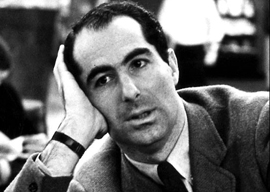
May 31, 2011

Philip Roth
As the conservative 50s gave way to the permissive 60s and 70s, Roth maintained an uncanny ability to offend the squares, although who exactly comprised “the squares” changed with the decades. In 1995’s Sabbath’s Theater, Roth is acutely aware of the cultural shift that has seen the humorless, uptight moralists and censorious busybodies moving from the right to the left. His protagonist, the aging and (of course) oversexed protagonist Mickey Sabbath, finds himself on the wrong side of morality’s righteous defenders in two very different decades. First, in the 50s, the lecherous young street puppeteer is arrested for removing a coed’s breast from her blouse during a public performance; the morally outraged here are devout Catholics and indignant policemen. Then in the PC nineties, he loses his job at a university for gross sexual harassment of a girl decades his junior; this time the villain is a stridently feminist Japanese Dean of Students. Ruminating on his past and present, Sabbath caustically observes:
When I got written up in The Nation for taking a tit out on the street I was their noble savage for a week. Today they’d excoriate my balls off for so much as thinking about it, but in those days it made me heroic to all right-thinking people.
Mickey Sabbath has watched as Western society has changed over the past 50 years, but he has always maintained his place as an outsider—a cynical observer of the overconfident self-importance that often attaches itself to defenders of the status quo, an unbuttoned (in every sense) character who is too exuberant and undisciplined for his own good. The near-seamless switch from conservative to liberal orthodoxies, and the role of the hapless individual floating on the tides of these changes, is a theme that Roth comes back to often in his later works—notably The Human Stain, in which a light-skinned black man goes from having to endure brainless racism (and thus trying to hide his racial identity) to being victimized by a particularly brainless strain of Clinton-era campus political correctness.
So there is something oddly cheering about seeing Roth, now in his seventh decade in publishing, still managing to annoy a Booker judge so much that she’s willing to storm off a committee in protest because she finds his work offensive. (Or rather, she simply doesn’t think it’s very good. No, wait, it’s because he’s American. I lost track.)
Roth is almost old enough to be your granddad’s granddad yet still has the capacity to get under self-righteous people’s skin as effortlessly as he did 50 years ago. You’d have to be stone dead not to find this amusing and a bit awe-inspiring.